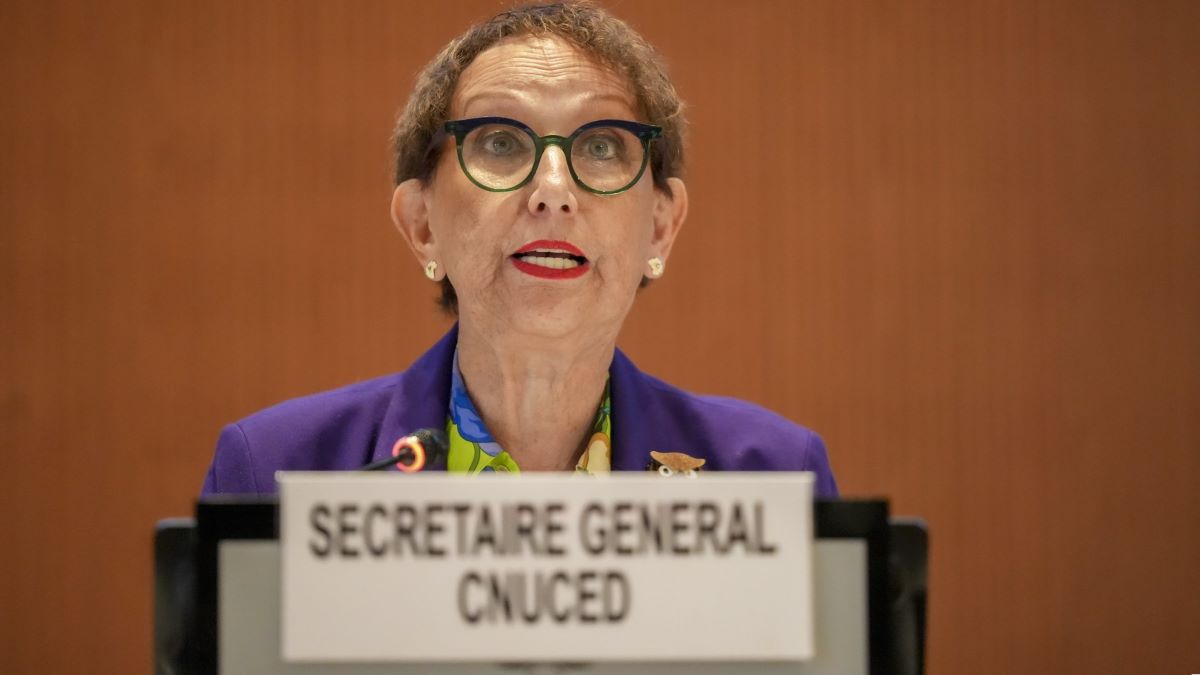The upcoming 16th ministerial conference of UN Trade and Development (UNCTAD) will give new momentum to power the economic transformations urgently needed in a changing world.
© UNCTAD Photo | Secretary-General Rebeca Grynspan speaks to the 71st session of the Trade and Development Board on 16 September in Geneva.
The 16th quadrennial conference of UN Trade and Development (UNCTAD), or UNCTAD16, is set to take place in late 2025, themed "Shaping the future: Driving sustainable economic transformation for a changing world".
The announcement came from Secretary-General Rebeca Grynspan in her address to a high-level Trade and Development Board meeting in Geneva on 16 September.
“UNCTAD16 will be crucial to say with concrete deeds how this institution, because of its universal membership, because of its memory, because of its knowledge and because of its mandate, is positioned to shape this new future,” Ms Grynspan told ambassadors, non-governmental organizations and intergovernmental bodies in attendance.
The Trade and Development Board acts as UNCTAD's governing body in between ministerial conferences, overseeing activities of the organization.
Kicking off its 71st session, the board lauds Secretary-General Grynspan’s leadership in steering UNCTAD through complex reforms and raising the visibility and impact of the organization’s work in shaping the international development agenda.
Harnessing winds of change
The multiple, interlocking challenges facing today’s world, from widening inequalities and growth deceleration to trade disruptions and falling investment, demand immediate attention and collaborative action.
UN Trade and Development has projected global GDP growth to stay below 3% in 2024 – continuing post-COVID-19-pandemic slowdown – and repeatedly warned that 3.3 billion people live in countries spending more on debt repayments than on health or education.
In a world marked by resilience in some countries and persistent vulnerabilities in others, Secretary-General Grynspan underscored that UNCTAD16 must deliver “tangible outcomes and strengthen our organization's contribution in the new global economy”.
To do so, UN Trade and Development will continue enhancing its usefulness to countries in their hour of need.
This entails “before” with technical cooperation, capacity building and policy support; “during” with rapid assessments and crisis resolution, and “after” with data-driven and evidence-based research.
“Our big challenge is to close the gaps and build, support and strengthen the capacities to adapt, to innovate, and to harness the winds of change,” Ms Grynspan added.
Discussions on UNCTAD16
During the meetings, member states recognized Secretary-General Grynspan's informal discussion paper as a basis for conversations ahead of UNCTAD16.
They committed to actively engaging in negotiations for the UNCTAD 16 outcome document to enhance the conference’s role and impact.
Countries also emphasized the importance of ensuring that the outcome aligns with major global initiatives.
These include the Pact for the Future – set to be adopted at the United Nations Summit of the Future – to foster long-term international cooperation, and the 4th International Conference on Financing for Development, aimed at addressing financial barriers to sustainable development, among others.
Main topical issues for deliberation
The 71st session of the Trade and Development will run through 27 September. Other issues of importance include:
- Investment for development: Investment facilitation and digital government
- New trade dynamics: Realizing inclusive trade gains
- The environmental footprint of digitalization: Sustainable strategies throughout the life cycle of digitalization
- Report on UNCTAD assistance to the Palestinian people
- Activities undertaken by UNCTAD in support of Africa
- UNCTAD strategy to support small island developing states
- Implementation of the outcomes of the 15th session of the UN Conference on Trade and Development.

